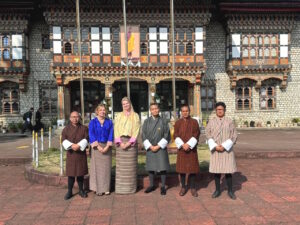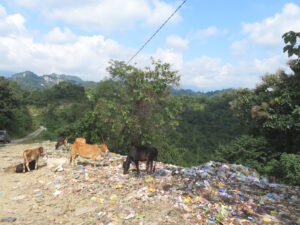Plastic is a material that we all use daily and is irreplaceable in several industries and applications. But plastic also comes with two major problems. Firstly, it is made from fossil fuels and contributes to the increased amount of carbon dioxide in the atmosphere. Secondly, it is a difficult-to-degrade material that contributes to littering and environmental problems worldwide.
We are two Swedish students from Lund University of Technology who traveled to Bhutan to write our Master’s thesis regarding the latter, namely plastic waste management in the country.
In addition to the amazing experience of traveling in the country and being met by Bhutanese hospitality, we conducted a field study consisting of interviews with actors in plastic waste management, mainly in Thimphu and Dewathang. Through this, we were able to compare the conditions between an urban and a more sparsely populated area. During our travels, we could see piles of garbage containing, among other things, plastic along the roads. We also witnessed how garbage such as plastic was burned in homemade bonfires.
The interviews gave us insights into how waste is managed in the country. Most household waste is collected once or twice a week and transported to landfills, where it is not further processed. In several places, including the capital Thimphu, landfills have become overcrowded, leading to the opening of new facilities to fill up with waste. In rural areas, some products, such as plastic bags, are reused, and food waste is often fed to livestock and dogs. Yet a large portion of the waste, including plastic, ends up on the ground and contributes to littering.
During the interviews, several major challenges were identified that hinder the work of creating a waste-free society. The country’s road infrastructure makes it difficult to transport waste to facilities, especially from more remote areas.
In addition, old habits and mindsets still live on among a large part of the population, especially among older generations, from the time before the country opened up to the outside world and began importing plastic. At that time, packaging consisted mainly of biodegradable materials that could be thrown into nature without major consequences.
Another challenge is the economic conditions. Bhutan has a limited industrial infrastructure for handling plastic waste and recycling, which makes it expensive for individual actors to properly manage their waste or invest in new solutions. Transporting waste to other countries for recycling is a current common practice, but it also makes it difficult for the country to create local solutions.
In addition, the lack of clean drinking water means that the people of Bhutan are dependent on buying their water in plastic bottles that often end up in the wild or in landfills. Finally, there is also a lack of complete data collection, which makes it difficult to even quantify the problem and thus take action.
Despite these challenges, there is potential for improvement. Initiatives such as recycling plastic for new products and awareness-raising campaigns have already been launched. Investment in clean drinking water systems can reduce the use of plastic bottles, and a national recycling system for plastic packaging would have a major long-term impact.
These could be advantageously combined with other smaller-scale solutions such as banning single-use plastic bags (this ban has existed before but was not followed up, but by comparing with other countries where the order has been more successful, it can still be considered feasible), replacing religious offerings with plastic-free ones (there are currently rules regarding this in some temples in the country) and using recycled plastic instead of new plastic in the construction of roads (projects that are already underway today).
Such initiatives also need to be combined with data collection to understand the extent of the problem and develop effective strategies.
All the stakeholders we interviewed agreed that plastic has become such an obvious part of society that it is now impossible to live without it. On the contrary, consumption, imports and the amount of plastic waste are expected to increase in line with population growth and urbanization.
The problem is acute, and continuing to dump plastic waste without long-term plans is not sustainable. A combination of the proposed solutions is a step in the right direction, but further research and efforts are needed to develop new feasible solutions. Only through such measures can Bhutan avoid losing its unique nature to littering while meeting both global and national environmental goals.
For us, the trip to Bhutan was an invaluable experience, both academically and personally. Gaining insight into Bhutan’s challenges has given us new perspectives on global waste issues and how local solutions can be adapted to different contexts. We hope that our thesis can contribute to a broader discussion about sustainable solutions for plastic waste, both in Bhutan and globally.
Text and photo: Julia Andersson and Alva Palm Nettelbladt, Lund University of Technology


